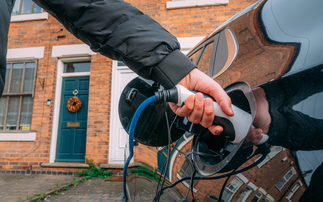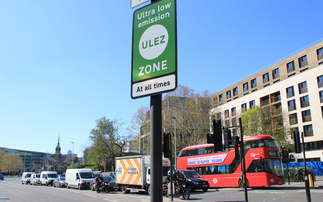From stable policies to constant innovation, the auto sector demonstrates that clean technology can deliver decarbonisation
6. The EU can be a force for good
It was, of course, the EU that imposed emissions targets on the auto industry, just as it had also led efforts to phase out lead in petrol. The ability of the world's largest market to establish environmental standards that protect citizens and drive innovation is an oft-overlooked component of the debate about the UK's future within Europe. As Saven observed, "if you want to swim in sewage, vote UKIP".
7. As can an effective approach to policy and taxation
Targets alone will not deliver the decarbonisation of an industry, without the backing of a policy environment that aids the technology transition and helps to stimulate clean tech investment. For several years that is precisely what the auto industry has had.
Chief secretary to the Treasury, Danny Alexander, detailed how the government had used a host of levers to drive the development of the low-carbon vehicle market, including tax breaks for low-emission vehicles and company car fleets, £900m of Ultra Low Emission Vehicle (ULEV) funding through grants, R&D projects, and spending on supporting infrastructure, and the creation of an attractive investment environment that helped convince the likes of Nissan and Ford to locate green car manufacturing lines in the UK.
As Greenwell observed, the reason he came out of retirement was because of what he saw as a combination of "coherent policy, cross-party political consensus, and what little money there is focused intensely on the areas where we have the opportunity to be world class".
8. But you need policy stability and consistent political messaging
In some respects it really is that simple: ambitious and consistent policy tends to get results. But as many of the panelists noted, consistency is the last thing that has been offered to the wider green economy and the energy and building sectors in particular.
Speaking on the same day as communities secretary Eric Pickles once again signaled that he was keen to block wind farm development, Jennifer Webber, director of external affairs at RenewableUK, wondered aloud as to "how easy it would be to keep investing in hybrid cars if you had government ministers talking about potentially scrapping them or scrapping them in five years' time".
Dave Sowden, chief executive of the Sustainable Energy Association, similarly asked why the auto industry was given the best part of a decade to meet its emissions targets, yet the building industry was still waiting for details on zero-carbon homes standards it is expected to comply with from 2016. "The green transformation in the auto industry has happened because it has had strong leadership, strong policy development and engagement with all parts of the industry, and that has come from the highest levels of government," he said. "Not a niche specialism in the Department for Transport, or in our sector the Department of Energy and Climate Change (DECC). Not Ed Davey fighting a lone battle on these issues in the Cabinet. It has come about because Number 10 and Number 11 Downing Street got transport policy, irrespective of political colour. And I am afraid that at this stage they don't quite get energy policy."
Alexander bristled at this criticism, insisting the Energy Act and the government's wider commitment to decarbonisation was now providing clean energy investors with the certainty they needed, as evidenced by Siemens' recent decision to locate its new offshore wind turbine factory in Hull. It was time for green campaigners to "get behind" policies such as the Energy Act and the Renewable Heat Incentive that were delivering investment, he said.
But, as Ekins argued, Alexander "made a great fist of pretending it is all joined up, but anyone who has been following energy policy over the past two years will know it has been anything but joined up with more or less open warfare between different government departments each wanting to go in different directions".
"There are lots of examples of this, unfortunately," he continued. "The failure to put a decarbonisation target in the Energy Act was one of the most egregious, because electric vehicles will not be low-carbon vehicles, let alone ultra-low emission, if we don't have ultra-low-carbon electricity to power them. We had the gas strategy being launched at the same time as the Energy Act was going through, which introduced almost terminal confusion into the market as to what the role of gas would be in the late 2020s and post-2030. Would it be a backup generating fuel for intermittent renewables or would it be a base-load generating fuel?
"Then we had the fiasco – and that is not too strong a word – of government policy on buildings and energy efficiency in buildings. Whether it is the miscalled 'conservatory tax', whether it is failure to enforce building regulations that means new homes are not being built to existing standards, whether it is the complete failure to get the zero-carbon homes agenda together, whether it is the attempt to stop the Merton Rule – I would have to say that if the prime minister really wanted to reclaim his green credentials, he would have to replace the secretary of state at DCLG in his next Cabinet reshuffle, because he has done absolutely nothing for this agenda."
In short, you need policy stability and consistent political signals, and the green economy has had neither.
9. Make green products "alluring"
One of the most important lessons the green car industry has offered is the importance of ditching a hairshirt environmental agenda in favour of clean technologies people actually want.
As James Cameron of Climate Change Capital argued, the auto industry had proven highly effective at making cleaner vehicles that were "alluring"; that were "not just greener, but better".
"One of the things that really is alluring about the transportation sector as a guide to the rest [of the green economy] is that it is perfectly possible to argue that the new stuff is better than the old stuff; that the technology has improved; that the use of the vehicle is better," he said. "You can apply this reasoning, this combination of science and technology, build quality, export markets attached to brands that we can establish because we are good at them, to lots of other sectors. You can certainly do it in the built environment – a green building can be experienced as a better building to live and work in. It feels like progress, it doesn't feel like punishment.
"That is the narrative I would like to see emerge. The transportation sector is helping us build a positive, optimistic narrative about how life gets better, having solved some of these complex problems relating to the environment, even whilst we carry a different label and we barely mention that it is to do with the environment."
10. Acknowledge that you are always "on a journey"
The "journey" may have become the self-parodying catchphrase of reality TV contestants everywhere, but it is also a defining feature of any effective decarbonisation strategy. JLR's Crisp, the Low Carbon Vehicle Partnership's Eastlake, and the Automotive Investment Organisation's Greenwell all stressed that while the industry had made good progress in recent years, that is all it had done.
All decarbonisation efforts falter as soon as a company or an industry rests on its laurels or starts to think it has done its fair share and no longer needs to accelerate its emission-reduction efforts.
The success of the auto industry contains plenty of lessons for the wider greener economy, but one of the most important lessons of all is that it knows it still has a long way to go before it becomes genuinely sustainable.
BusinessGreen was a media partner for the Sustainability Hub event, "Green and growth: We can have both - lessons for road transport and other sectors"









